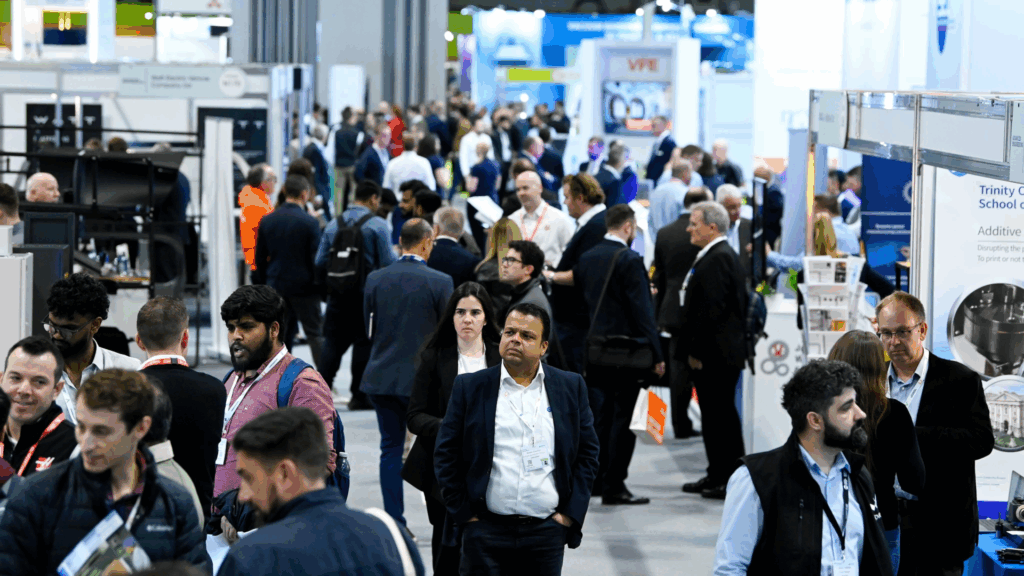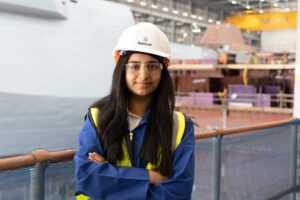
Airline efficiency could cut emissions by 50–75 per cent
Operating only the most fuel-efficient aircraft, removing premium-class seating to carry more passengers, and raising passenger loads could reduce global aviation emissions by 50-75 per cent.

London, October 01, 2025
When people think of warship building, images of massive vessels being floated out of shipyards might spring to mind. But behind every frigate, destroyer or support vessel is a distributed network of suppliers consisting of component makers, metallurgists, engine builders and materials specialists — many of them rooted far from the coast. The Midlands, often better known for its automotive and aerospace prowess, plays a critical but under-appreciated role in marine procurement, explains Simon Farnfield, event director at Advanced Engineering, the annual gathering of engineering and manufacturing professionals.
If you’re a Midlands company hoping to plug into naval shipbuilding, understanding how the Royal Navy buys matters. The Royal Navy’s procurement is handled primarily by its Navy Command Commercial (NCC) team, alongside other Ministry of Defence (MOD) agencies like Defence Equipment & Support (DE&S), the Defence Science & Technology Laboratory (DSTL) and the Submarine Delivery Agency.
These organisations issue contract opportunities via the Defence Sourcing Portal and hold industry open days and workshops so suppliers can get early visibility of what the Navy will need. For firms in the Midlands, this means that even if you’re not in a coastal yard, you can still engage by offering components, systems or materials that feed into the build.
Not just aerospace and automotive
The Midlands is already famous for pioneering in aerospace and engine technologies. For instance, Rolls-Royce has a huge presence in Derby and its Control & Data Services in Birmingham manufactures engine control systems that are as crucial for marine propulsion systems as they are for aircraft.
Then you have specialist materials firms, precision machining and subcontract engineering companies that supply metals, alloys, seals, electronic/electromechanical controls, all of which are essential parts of any modern warship.
Another example is Doncasters Group – headquartered in Burton-upon-Trent, Staffordshire. They’re a long-established specialist in high-performance alloys and precision components, particularly turbine blades and structural parts used in aerospace, defence and energy. Their castings and forgings are critical for jet engines and land/sea-based defence systems.
There are also smaller, more niche fabricators too. Take CE Turner, for example, a company based in the Midlands that supplies fabricated and machined parts and assemblies for naval craft as well as land systems. Think armour, brackets, precision welds, the kind of supplier the Navy wants in its ecosystem.
A distributed supply chain
In addition, in previous Type-31 frigate supply chain announcements, companies across the UK were awarded contracts for engines, exhausts, gearboxes and so on. Rolls-Royce’s MTU business, for main engines and diesel generators, Renk for reduction gearboxes, MAN Energy Solutions for propellers and shaft lines, Darchem Engineering and others for intake and exhaust systems.
While not all of those are in the Midlands, the pattern shows there is opportunity for firms that can meet high technical standards, precision manufacturing, environmental and emissions compliance. Midlands firms with those capabilities are well-positioned to win or build new capability to bid.
Take M&H Engines in Stratford‑upon‑Avon. Specialising in Stage V emission‑compliant diesel engines, M&H produces propulsion and auxiliary power units designed for the marine sector. These engines demonstrate how advanced engineering happens inland — manufactured in Warwickshire before being shipped in parts to shipyards for assembly.
It’s a perfect example of how the UK’s naval capability relies on a distributed supply chain, with critical components coming together from across the country rather than transporting complete vessels down the M1.
Royal Navy at the show
Visitors to Advanced Engineering will also have the chance to hear directly from the Royal Navy about where innovation is most urgently needed. On Thursday 30th October at 11:30am, the Royal Navy Innovation & Technology Needs session takes place on the Main Stage as part of the Future of Engineering programme, powered by automation, robotics and AI.
The speaker will be Chester Butterworth, Head of Strategy at the Royal Navy’s Disruptive Capabilities and Technologies Office. Chester’s perspective is derived from a rare mix of frontline naval service as a warfare officer and senior civilian roles across exports, science advice and technology leadership.
Today, he oversees the Navy’s approach to disruptive technologies, applying a “show not tell” philosophy that has already delivered national firsts in areas such as quantum. His role is about more than long-term vision, it’s about creating pathways for suppliers and innovators to plug into the Navy’s needs.
Later that day, at 1:55pm, he will also appear on the Defence Panel within the Aerospace, Defence & Satellite Engineering Forum. This second session broadens the discussion to defence policy and cross-sector collaboration, giving suppliers a wider context for how technologies proven in one area, from aerospace to energy, can transfer into naval applications.
For marine suppliers in particular, it underlines the message that warship building isn’t confined to the coast. Instead, it depends on a nationwide ecosystem of innovation, with Advanced Engineering providing the forum where those inland capabilities connect to naval demand.
With free visitor registration now live for Advanced Engineering UK, taking place on October 29 and 30, 2025 at the NEC, Birmingham, early registrants will receive exclusive updates on speakers, exhibitors and feature areas. Register today via the website here.

Operating only the most fuel-efficient aircraft, removing premium-class seating to carry more passengers, and raising passenger loads could reduce global aviation emissions by 50-75 per cent.

Backed by over £210 million, a new UK Government Cyber Action Plan published today sets out how government will rise to meet the growing range of online threats

Babcock has announced a record intake of early-career talent for 2025, recruiting 500 apprentices and 250 graduates across its UK operations.